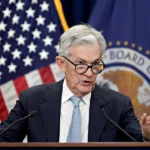오늘 PU Xtrader 챌린지에 참여하세요
시뮬레이션 자본으로 거래하고 우리의 트레이더 평가를 통과한 후 실제 이익을 얻으십시오.
오늘 PU Xtrader 챌린지에 참여하세요
시뮬레이션 자본으로 거래하고 우리의 트레이더 평가를 통과한 후 실제 이익을 얻으십시오.
Has the banking crisis abated? Equity investors seem to think so, with the Nasdaq surging close to 2% on Wednesday as the markets assess a successful containment of the banking crisis caused by the failure of regional banks and one Credit Suisse. This puts the tech-heavy index technically in bull market territory, closing more than 20% higher than its December low after seeing two weeks of gains.
Meanwhile, the Dow up 1%, and the S&P 500 up 1.4% – led by the semiconductor sector; with Micron up 7.2%, Intel up 7.6%, and Nvidia up 2.2%. Investors weren’t just snapping up oversold tech stocks too, with Lululemon surging more than 12% after a positive revenue report, while regional banks like the embattled First Republic jumped after receiving lifelines from the big guys.
While the markets are cheering the aversion of a major bank crisis, one possible cap to the upside also lies in the same reason – the Fed might get the confidence to proceed with its plan for inflation-battling rate hikes. Punters, however, are still betting on a relatively dovish Fed, with 56% saying that hikes will pause at the 31 May FOMC meeting; while the other 44% betting on a 25-point increase. Consequently, the bond markets have sharply priced in a recession, betting on a hike pause or even reversal.
This marks a growing disparity between market and Fed outlooks – even with guidance on the central bank’s part, with Fed Chair Powell reiterating in previous announcements that rates will stay up to combat inflation.
Chris Senyek of Wolfe Research thinks that the Fed will be implementing a 25-point hike, saying that the central bank is in a difficult position. “With banks stabilising, inflation still way above target, the labour market still historically strong, and the Fed desperately needing to rebuild credibility.”
Blackrock has mirrored this view, saying that the markets are mistaken with their interest rate bets. Strategists from the firm say they “See a new, more nuanced phase of curbing inflation ahead: less fighting but still no rate cuts” – unless a “more serious credit crunch” causes an unexpectedly severe recession.
Broadly speaking, everything hinges on the banks now – over $100bn in deposits have been lost in the past week; but $475 bn has been borrowed from the Fed in a bid to boost liquidity for banks. Moody’s has released a comment saying sovereign credit risks are “limited unless strains deepen”.
Investors are reminded to look out for the next soonest measure of inflation, the Core PCE Price Index for February, which will be announced on Friday, 31 Mar at 15:30 (GMT+3).
As a friendly reminder, do keep an eye on market changes, control your positions, and manage your risk well.

Trade forex, indices, cryptocurrencies, and more at industry-low spreads and lightning-fast execution.

8 December 2023, 01:37 Economists Anticipate The Fed To Keep Rates Steady In December

4 December 2023, 03:20 Nonfarm Payrolls Forecasted At 175K Increase

24 November 2023, 02:43 Anticipation Of RBNZ Holding High Rates